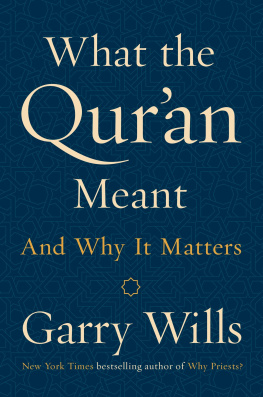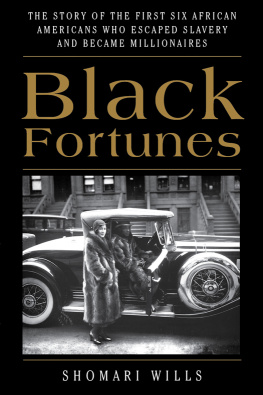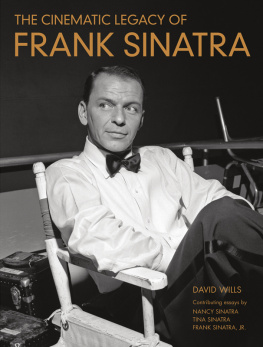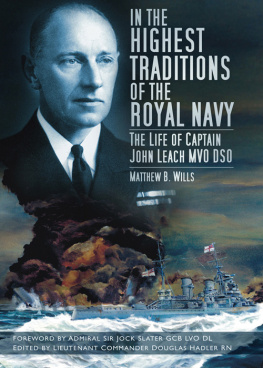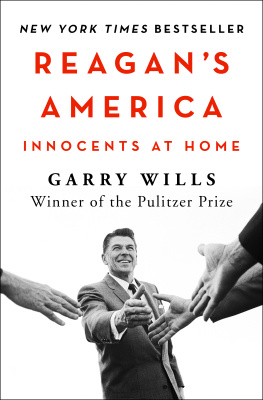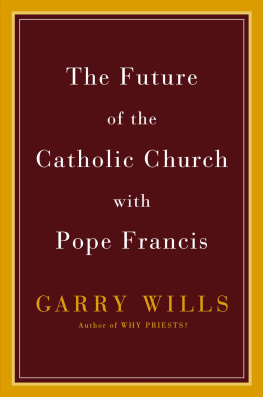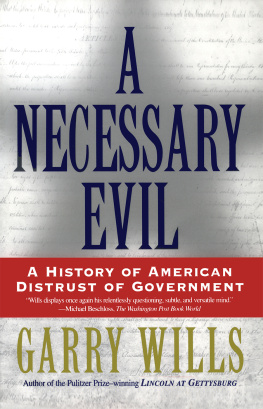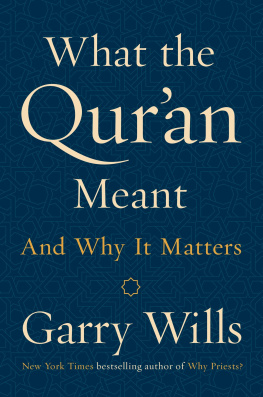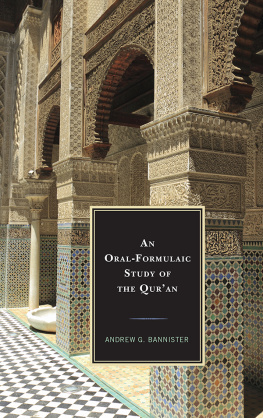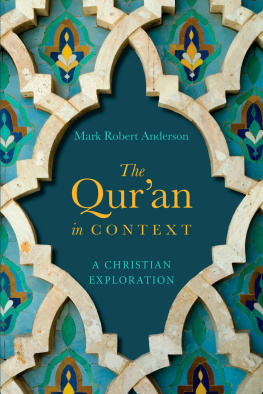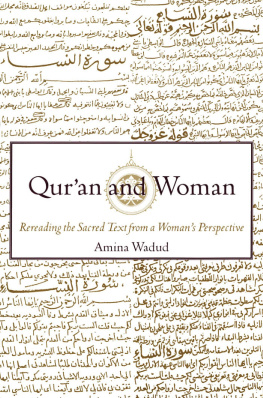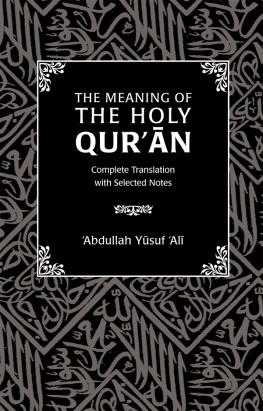Wills - What the Qurʼan meant and why it matters
Here you can read online Wills - What the Qurʼan meant and why it matters full text of the book (entire story) in english for free. Download pdf and epub, get meaning, cover and reviews about this ebook. City: New York, year: 2017, publisher: Penguin Publishing Group;Viking, genre: Religion. Description of the work, (preface) as well as reviews are available. Best literature library LitArk.com created for fans of good reading and offers a wide selection of genres:
Romance novel
Science fiction
Adventure
Detective
Science
History
Home and family
Prose
Art
Politics
Computer
Non-fiction
Religion
Business
Children
Humor
Choose a favorite category and find really read worthwhile books. Enjoy immersion in the world of imagination, feel the emotions of the characters or learn something new for yourself, make an fascinating discovery.
What the Qurʼan meant and why it matters: summary, description and annotation
We offer to read an annotation, description, summary or preface (depends on what the author of the book "What the Qurʼan meant and why it matters" wrote himself). If you haven't found the necessary information about the book — write in the comments, we will try to find it.
What the Qurʼan meant and why it matters — read online for free the complete book (whole text) full work
Below is the text of the book, divided by pages. System saving the place of the last page read, allows you to conveniently read the book "What the Qurʼan meant and why it matters" online for free, without having to search again every time where you left off. Put a bookmark, and you can go to the page where you finished reading at any time.
Font size:
Interval:
Bookmark:

The Future of the Catholic Church with Pope Francis
Why Priests?
Outside Looking In
Bomb Power
Martials Epigrams
What the Gospels Meant
Head and Heart: A History of Christianity in America
What Paul Meant
What Jesus Meant
The Rosary
Why I Am a Catholic
Saint Augustine, Confessions (Translation)
Papal Sin: Structures of Deceit
Saint Augustine: A Life (A Penguin Lives Biography)
Lincoln at Gettysburg: The Words That Remade America

VIKING
An imprint of Penguin Random House LLC
375 Hudson Street
New York, New York 10014
penguin.com
Copyright 2017 by Garry Wills
Penguin supports copyright. Copyright fuels creativity, encourages diverse voices, promotes free speech, and creates a vibrant culture. Thank you for buying an authorized edition of this book and for complying with copyright laws by not reproducing, scanning, or distributing any part of it in any form without permission. You are supporting writers and allowing Penguin to continue to publish books for every reader.
Excerpts from The Quran, translated by M. A. S. Abdel Haleem, Oxford World Classics (2008). By permission of Oxford University Press.
LIBRARY OF CONGRESS CATALOGING-IN-PUBLICATION DATA
Name: Wills, Garry, 1934 author.
Title: What the Quran meant and why it matters / Garry Wills.
Description: New York : Viking, 2017. | Includes index.
Identifiers: LCCN 2017025971 (print) | LCCN 2017025389 (ebook) | ISBN 9781101981023 (hardcover) | ISBN 9781101981030 (ebook)
Subjects: LCSH: QuranCriticism, interpretation, etc. | IslamDoctrines.
Classification: LCC BP130 .W55 2017 (ebook) | LCC BP130 (print) | DDC 297.1/226dc23
LC record available at https://lccn.loc.gov/2017025971
Version_1
To Bud Moynihan
carissime
Introduction: My Quran Problem
K nowing something about the Quran might, in another time, have been an ornament of the moderately learned. Not now. Now we face a world where knowledge about the Quran must deal with militant misuses of it and blatantly distorted reports of what it says. To help the majority of believers in Islam, and to be helped by them, we must see how far terrorists have departed from the book they say they believe in.
Influential people in our country tell us blatant lies about the religion that is followed by millions of peaceful Muslims, and we have no way to correct those claims unless we look at the morality of the Quran.
Yet there are many people who would block our reading of it. They think the Quran is not for reading but for burning. A cranky southern pastor put the book on trial for crimes against humanity, and condemned it to the flames, with terrible consequences abroad. Presumably, it could inflame children to burn down their schools.
Mr. Buckley was hardly alone in blaming the Quran (which he clearly had not read) for the attacks of 9/11. Donald Trump was believed by his devotees when he claimed that he saw, that day, thousands and thousands of Muslims in Jersey City cheering as that building was coming down.
Actually, a range of polls around the world found a majority of Muslims opposed to the World Trade Center attack and other forms of violence. One extensive world poll by the Gallup organization found that 93 percent of Muslims opposed the 9/11 attacks.
More important, perhaps, is the fact that the Muslim majority that disapproves of terrorism is more religious (more Quran-based) than the minority that approves of terrorismthe latter act more on secular motives like resentment of colonial powers. Indeed, Patricia Crone notes that terrorists are theologically illiterate:
People like Osama bin Laden and Ayman al-Zawahiri dont even seem to know their own tradition all that well. Rather, they have stripped Islam of practically everything that most Muslims consider to be their religion.
Thus, when ISIS claimed to be acting from the Quran, over 120 Muslim scholars denounced this as a perversion of the sacred text.
It is not only Muslim authorities who say that the Quran does not favor violence rather than peace. This is also a judgment about the book reached by studious non-Muslimsfrom a secularist genius like Edward Gibbon to a deeply pious man like Pope Francis. Gibbon wrote in the eighteenth century:
A pernicious tenet has been imputed to the Mahometans, the duty of extirpating all other religions by the sword. This charge of ignorance and bigotry is refuted by the Koran, by the history of the Musulman conquerors, and by their public and legal tolerations of the Christian worship.
And Pope Francis wrote in the twenty-first century:
Authentic Islam and the proper reading of the Koran are opposed to every form of violence.
Yet despite this mountain of evidence that the religion of Islam favors peace over violence, and the evidence of the vast majority of Muslims who live as useful citizens in our midst (some of them, like Captain Humayun Khan, dying heroically in the United States Army), there is a large and lucrative business for telling Americans what horrible things are in the Quran (they arent). Dozens of states have passed or proposed bans on Shariah law, as if that were an evil product of the Quran (it isnt). Women with hijabs are considered dangerous, since they are clothing themselves according to the Quran (they are not). Men wearing turbans are shunned as Muslims (they are Sikhs). Mosques are being banned or defaced for teaching the Quran.
This is a dangerous way to alienate the vast numbers of Muslims in the world. Jointly, the two greatest bodies of religious believers, Christianity and Islam, represent over half of the inhabitants of our globe2.2 billion Christians (31 percent of the population), 1.6 billion Muslims (23 percent of the population). By 2050 the numbers will be roughly equal. Yet in this shrinking and interconnected world, there is a vast ignorance of Islam, its varieties, its hopeful possibilities and its lurking dangers. This ignorance undermines any sensible policies toward the Islamic world. The invasion of Iraq, for instance, the worst foreign policy decision of our recent history, was led by President Bush with no awareness that we were not just unseating a dictator but overthrowing a Sunni Muslim regime that ruled a Shia Muslim majority population, with predictable Sunni reprisals that continue to detonate.
I am unfortunately well qualified to speak about our ignorance where Muslims are concerned. After our disastrous invasion of Iraq, I was asked by a friend if I had ever read the Quran. I was embarrassed to answer her, No. I had spent my whole adult life studying Christianity in one way or another, while remaining ignorant of the only other religion of a similar scale. And I was not alone in my ignorance. When I began to ask university audiences how many had read the Quran, dispiritingly few hands went up.
I have to admit that the Quran is not at first a gripping read. My early slogs through it were dutiful and apparently unrewarding. There are no obvious threads to follow, no apparent organizing principle. It is a series of disjunct revelations made to Muhammad, as recorded by his followers on pottery shards or other handy surfaces. These were transferred to paper, then arranged by believers after Muhammads death, not in chronological or topical order but,
Font size:
Interval:
Bookmark:
Similar books «What the Qurʼan meant and why it matters»
Look at similar books to What the Qurʼan meant and why it matters. We have selected literature similar in name and meaning in the hope of providing readers with more options to find new, interesting, not yet read works.
Discussion, reviews of the book What the Qurʼan meant and why it matters and just readers' own opinions. Leave your comments, write what you think about the work, its meaning or the main characters. Specify what exactly you liked and what you didn't like, and why you think so.

